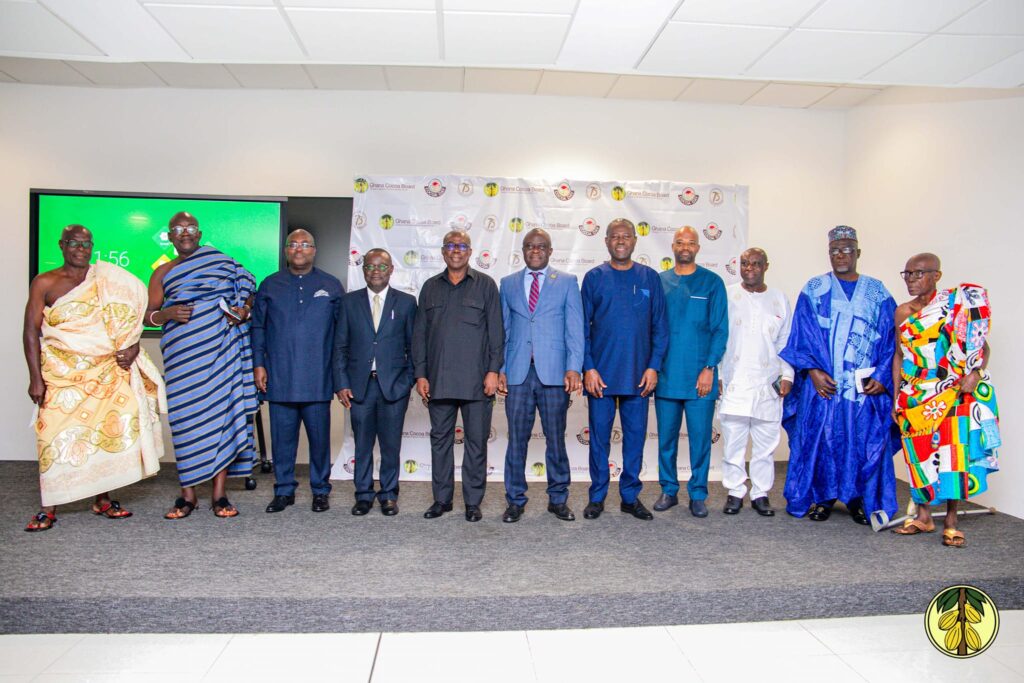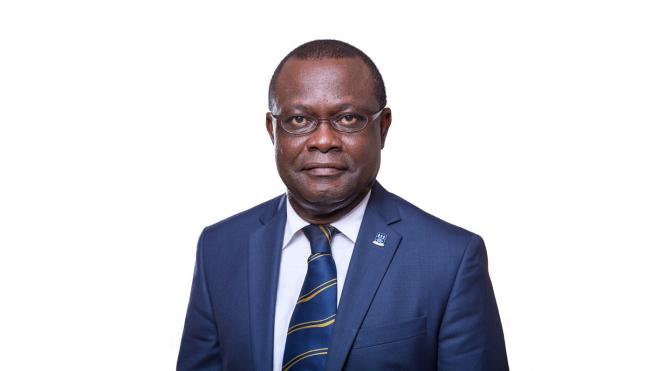Ghana Must Prioritise Value Addition Against Export Of Raw Cocoa
Former Vice-Chancellor of the University of Ghana, Professor Ebenezer Oduro Owusu, has called for a shift away from the export of raw cocoa to a focus on local value addition and consumption.
He noted that current and past governments have worked to ensure that cocoa gets a good sale value on the international market, to the detriment of local use.
He mused that many a Ghanaian home does not use cocoa in preparing meals, a practice which was once common among Ghanaian families in cocoa-producing areas.
Prof. Owusu said, “We need to consume what we produce. We need to ensure that locally, we consume cocoa. Cocoa has lots of health benefits.”
He suggested that cocoa be used more regularly in the preparation of local dishes, reminiscing that he had been fed on cocoa-infused “ɛtɔ” when he was growing up in Kwahu Tafo in the Eastern Region of Ghana.
He continued, “As a nation, we must make frantic efforts to develop local cocoa diets that will ensure that we consume what we produce.”
COCOBOD @75
Prof. Owusu was delivering a lecture to commemorate the 75th anniversary of the Ghanaian cocoa regulatory body on the topic: “COCOBOD @75: Sustaining Our Environment, Wealth and Health.”
Ghana Cocoa Board (COCOBOD) was established as a cocoa regulatory agency in 1947 to replace the erstwhile Cocoa Marketing Board (CMB).
Its establishment a decade after the 1937 cocoa hold-up was hoped to streamline cocoa trading to prevent the factors that led cocoa farmers in the then Gold Coast to destroy their produce in protest of exploitative prices under the British colonial regime.

2022 Cocoa Day
The occasion was also used to launch the 2022 Cocoa Day, which is slated for October 1.
Touching on the consumption of chocolate products, Prof. Owusu admitted that pricing concerns had largely deterred the citizenry from regularly consuming made-in-Ghana chocolate products, thus accounting for the almost rapt focus on the export of cocoa beans to the processing factories in the West.
He also called for the New Products Unit of the Cocoa Research Institute of Ghana (CRIG) to be better resourced to bring new approaches to the production and value addition of cocoa in the country.
He noted that in so doing, the nation will transcend its current production capacity and also “assume a more leading role in cocoa research and innovations.”
Ghana’s per capita cocoa consumption is 0.53kg
The country’s per capita cocoa consumption is 0.53 kilogramme, which is far below the consumption rate in Europe and the Americas which hovered around 6.6 kilogrammes per capita consumption.
Need to step up per capita consumption of cocoa products
The nation needed to step up its per capita consumption of chocolate and other cocoa products locally, to boost the national economy and reduce the export of raw cocoa beans for processing.
40% of cocoa beans processed locally
Currently, Ghana processes 40% of its raw cocoa beans locally, and the government had set a target to process at least 50% of its cocoa beans locally.
As a reminder of the importance of research to the development of the cocoa sub-sector, he pointed to the development of early and high-yielding and pest-resistant varieties of the cash crop, which came about due to years of research.
19,000 hectares of cocoa farms destroyed by galamsey
Prof. Owusu called for more efforts to be made to “curb the unwarranted destruction of lands and the environment” especially in cocoa growing areas, where the Ghana Cocoa Board (COCOBOD) recently reported that about 19,000 hectares of cocoa farms had been destroyed due to the activities of illegal gold miners.
In a bemused commentary on the matter, the renowned entomologist said, “I find it very hard to understand why as a nation, we cannot be united to fight ‘evils’ that threaten the future of our dear country.”
He warned that if nothing concrete is done about the danger of galamsey, we might soon depend on the imports of food and potable water.
He said, “Polluted water bodies, destroyed aquatic lives, as well as shrink pathways of water bodies, are matters that may cost us so much as a nation.”
He asked, “Are we waiting for the time that as a nation, we may have to import water for drinking and the irrigation of agricultural crops?”
Besides this danger to water and land, he also cautioned that due to the presence of heavy metals like mercury in the soil from the galamsey activities, it is becoming difficult for Ghana’s cocoa to pass the heavy metals test when shipped to other jurisdictions.
He thus urged scientists at CRIG to research how long it will take for these lands to be restored to their original states.
Deputy Minister of Agriculture, Yaw Frimpong Addo, who represented Dr Owusu Afriyie Akoto at the event, noted that the theme of the lecture, ‘COCOBOD @75: Sustaining our environment, wealth and health,’ epitomises the government’s policy direction for the cocoa sector “by securing sustainable farming practices alongside boosting domestic cocoa production.”
Interventions
He emphasised that recent interventions in the sector, such as hand pollination, rehabilitation of cocoa farms, pruning and the supply of farming inputs have positively influenced production patterns.
664, 529 farmers captured on Cocoa Management System (CMS) database
He stated that work on the COCOBOD Cocoa Management System, a database of all farmers in the country, is near completion with the data about 664, 529 farmers so far captured unto it.
This, he said will make the implementation of the Cocoa Farmers’ Pension Scheme easy.
He commended the various players in the cocoa sector as well as all those who have led COCOBOD since its establishment, 75 years ago.
Chief Executive of COCOBOD, Joseph Boahen Aidoo, on his part stated that “making the cocoa industry more vibrant requires that cocoa farmers are better remunerated.”
This he explained, was the motivation behind the 29% increase in the producer price of cocoa from GH¢8,240 to GH¢10,560.
He indicated that the Board and Management of COCOBOD have resolved to reduce the debt burden drastically, by adopting austerity measures, due to the ongoing ravages of COVID-19, which has led to decreased demand for cocoa around the world.
Living Income Differential
According to the CE, the Living Income Differential remains the best pricing mechanism to regulate cocoa prices and cushion farmers against cocoa price volatility.
Planned activities for Cocoa Day celebrations
The Ghana Cocoa Day Celebrations will be held at the Presbyterian Boys’ Senior High School (SHS) at Suhum in the Eastern Region.
The programme of activities for the day includes a simultaneous walk by the staff of COCOBOD on Saturday, September 24, in Accra, Tema, Kumasi and Takoradi.
On Wednesday, September 28, there will be a float at Suhum and an exhibition by cocoa and chocolate producers, as well as agrochemical and input suppliers, financial institutions and NGOs on the Suhum SHS school park.
A forum on sustainable cocoa production as well as a cocoa quiz competition will be held on Thursday, September 29.
There will be a football competition among some four selected schools from the Eastern Region on Friday, September 30 at the Suhum School Park. This will be followed by a ‘Cocoa Night Concert.’
As the climax to the 75th Anniversary celebrations, there will be a grand durbar at Suhum Presbyterian SHS Park on Saturday, October 1.
- Major Ghana Cocoa Region 81% Infected with Bean Disease - July 22, 2024
- Ghana to Delay More Cocoa Deliveries as Supply Crisis Worsens - June 12, 2024
- Cocoa Production Helping Mitigate Climate Change Impact - June 10, 2024
